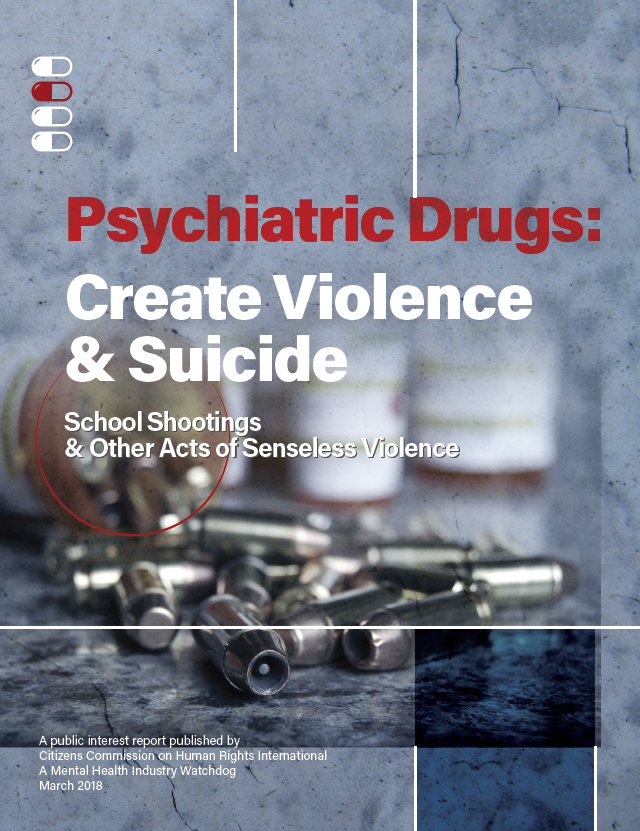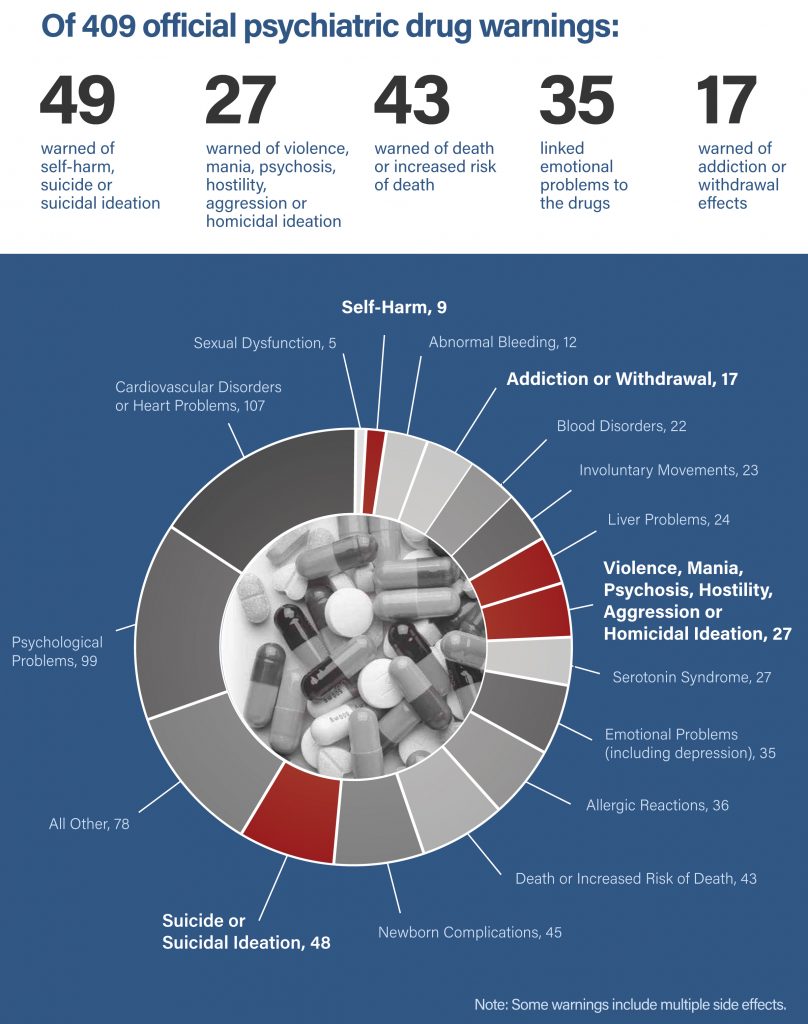 Read CCHR’s fully documented report Psychiatric Drugs: Create Violence & Suicide—School Shootings and Other Acts of Senseless Violence
Read CCHR’s fully documented report Psychiatric Drugs: Create Violence & Suicide—School Shootings and Other Acts of Senseless Violence
Do psychiatric drugs play a role in school shootings and other senseless acts of violence?
Although there can be numerous reasons for mass murder, violent crime, and suicide, with just as many solutions proposed to curb it and funding poured into its prevention, senseless acts of violence continue unabated. One aspect that has never been the subject of a government investigation, is the link between such heinous acts of senseless violence, such as school shootings, and those under the influence of mind-altering psychiatric drugs, documented to cause violence, mania, psychosis, depersonalization, and even homicidal ideation.
With millions of people prescribed psychiatric drugs, clearly not everyone taking them (or in withdrawal) will experience violence, mania, psychosis, or homicidal ideation. However, according to International Drug Regulatory Agency warnings, a percentage of them will. And no one knows who will be next.
School Shootings and School Violence
At least 39 school shootings and/or school-related acts of violence have been committed by those taking or withdrawing from psychiatric drugs resulting in 200 wounded and 100 killed (in other school shootings, information about their drug use was never made public—neither confirming or refuting if they were under the influence of prescribed drugs). This list includes those who have not only used guns, but also the use of knives, swords, and bombs. Moreover, this list is only comprised of cases where the perpetrator’s toxicology reports and/or psychiatric drug use were disclosed. More often than not, the perpetrator’s psychiatric drug use, or toxicology report is not made public.
Fully documented report on investigating the link between psychiatric drugs and violence
The mental health watchdog group, Citizens Commission on Human Rights (CCHR) International created a fully documented 64-page report that details more than 60 examples of school and mass shootings, stabbings, and senseless violent acts committed by those under the influence of psychotropic drugs or experiencing serious withdrawal from them. It also provides more than 30 studies that link antidepressants, antipsychotics, psychostimulants, mood stabilizers, and sedative-hypnotics to adverse effects that include hostility, mania, aggression, self-harm, suicide, and homicidal thoughts.
Citing Mental Illness as the “Cause”
Media quote experts saying that such individuals are “mentally disturbed,” or have “untreated mental illness,” but that doesn’t explain the level of violence we are seeing or what drives a person to pull a trigger or intentionally crash an airplane, killing all 150 people on board.
A review of scientific literature published in Ethical Human Psychology and Psychiatry regarding the “astonishing rate” of mental illness over the past 50 years revealed that it’s not “mental illness” causing the problem; rather, it’s the psychiatric drugs prescribed to treat it. Therefore, citing a mental disorder is not a predictor of aggressive behavior; however, the drugs prescribed to treat it are documented to cause such behavior.
There Must Be Disclosure of Psychiatric Drug Use in Investigations
Drug proponents argue that there are many shootings and acts of violence that have not been correlated to psychiatric (psychotropic) drugs, but that is exactly the point. It has neither been confirmed nor refuted, as law enforcement is not required to investigate or report on prescribed drugs linked to violence, and the media rarely pose the question. In cases of toxicology reports, the Coroner can decide not to publicly release the full toxicology report, even when the perpetrator is deceased.
CCHR is clear that not every violent killer has been documented to be under the influence of, or withdrawing from a psychotropic drug at the time of committing a crime, but in many cases, such drugs only emerge when investigative reporters probe the killer’s background. And the media does not always ask the right questions.
Therefore, some of the recommendations in the report include:
- Legislative hearings should be held to fully investigate the correlation between psychiatric treatment and violence and suicide.
- Toxicology testing for psychiatric drugs should be mandatory in cases where someone has committed a mass shooting or other serious violent crime, the information from which would become part of a national database that all branches and levels of law enforcement could access.



SHARE YOUR STORY/COMMENT